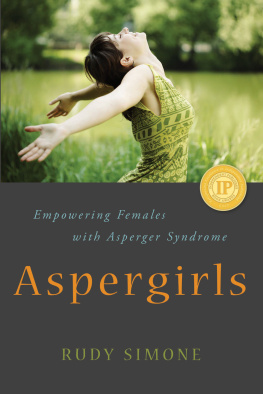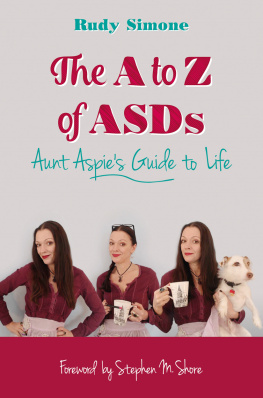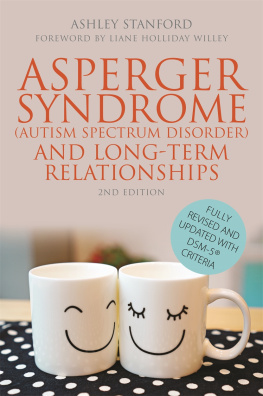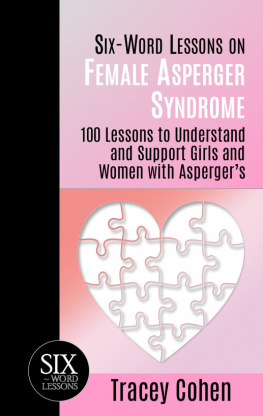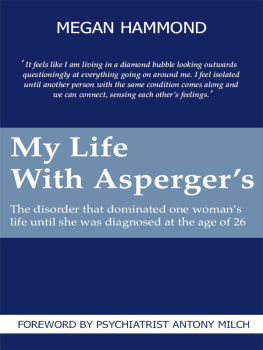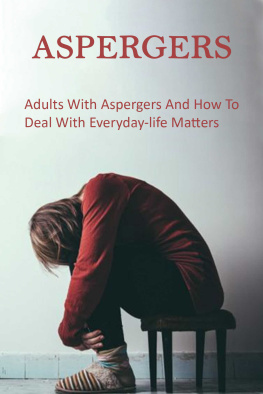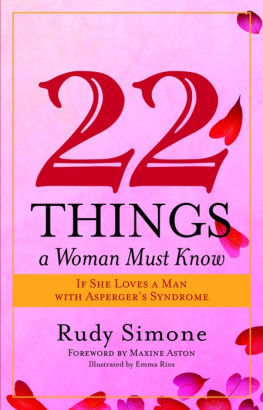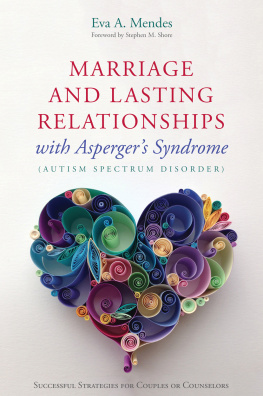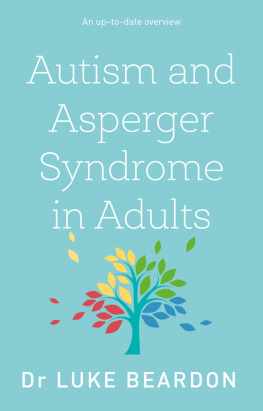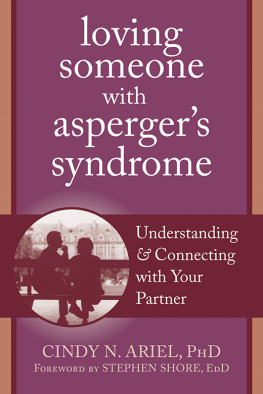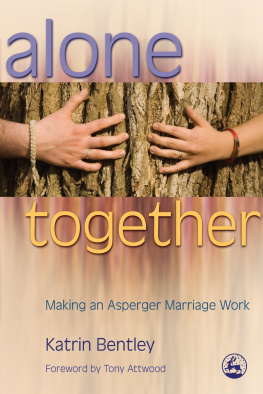22 Things a Woman Must Know If She Loves a Man with Aspergers Syndrome
Rudy Simone
Illustrated by Emma Rios
Jessica Kingsley Publishers
London and Philadelphia
First published in 2009
by Jessica Kingsley Publishers
116 Pentonville Road
London N1 9JB, UK
and
400 Market Street, Suite 400
Philadelphia, PA 19106, USA
www.jkp.com
Copyright Rudy Simone 2009
Foreword copyright Maxine Aston 2009
Illustrator copyright Emma Rios 2009
All rights reserved. No part of this publication may be reproduced in any material form (including photocopying or storing it in any medium by electronic means and whether or not transiently or incidentally to some other use of this publication) without the written permission of the copyright owner except in accordance with the provisions of the Copyright, Designs and Patents Act 1988 or under the terms of a licence issued by the Copyright Licensing Agency Ltd, Saffron House, 610 Kirby Street, London EC1N 8TS. Applications for the copyright owners written permission to reproduce any part of this publication should be addressed to the publisher.
Warning: The doing of an unauthorized act in relation to a copyright work may result in both a civil claim for damages and criminal prosecution.
Library of Congress Cataloging in Publication Data
A CIP catalog record for this book is available from the Library of Congress
British Library Cataloguing in Publication Data
A CIP catalogue record for this book is available from the British Library
ISBN 978 1 84905 803 2
eISBN 9781846429453
Converted to eBook by EasyEPUB
To Bill
Contents
Foreword
For over ten years I have worked with individuals and couples where one partner has Asperger Syndrome (AS). I have extensively researched the mental, emotional and physical effects that living in an AS/non-AS relationship can have on both partners. Research shows that more commonly, it is the man in the partnership who is affected by AS. I have frequently found that the women in the relationship work in the caring profession and are by nature very nurturing, caring and highly empathic. It appears that this type of woman is attracted to the seemingly child-like qualities that a man with AS will portray. This works initially in the relationship but over time, due to the neurological impact having AS will cause, the woman may start to feel her empathic ways are not being reciprocated. She may begin to feel emotionally isolated along with a sense of loneliness, and become aware that something is missing in the relationship. If the reasons for this are not identified then the long term stress this can cause will result in what is termed Cassandra Affective Deprivation Disorder (CADD). Of course, this emotional deprivation is not the intention of the AS partner; it is due to the limitations of theory of mind caused by having AS. However, if AS is not recognized, then neither partner will be aware of the cause and this will often result in blaming and frustration.
The majority of adults affected by AS will also be affected by Alexithymia, which is a Greek word meaning no words for feelings. Research has now shown that being in a relationship with a partner with Alexithymia will negatively affect relationship satisfaction and quality. The effects of this, and CADD, can be reduced if both partners accept and understand what is responsible for the difficulties in communication, intimacy and empathy within the relationship; it is then more likely that problems and misunderstandings can be avoided.
Men with AS are capable of true love, but as Rudy points out, the woman may not feel she is being loved in quite the way she would have hoped for. Often in the beginning of an AS/non-AS relationship, the female partner may have felt that she was the centre of his attention and been very flattered by the devotion and consideration he showed her. He will have made her feel very special and in some cases flooded her with time, gifts and romantic gestures. This passionate, initial stage can end quite quickly and once they marry or live together it can come to rather an abrupt end; she will be left wondering what went wrong or worse still, what did she do wrong. The relationship will then for her enter a stage of hope, where she will often begin in rescuer mode; then when nothing changes and the distance and lack of attention increases, she will find herself switch into persecutor mode. This is where her own self loathing starts to build up as she finds herself not liking the person she is becoming. How she acts and behaves will also have a huge impact on him. He will rarely make the connection between his behavior and her reactions. He will interpret her words as criticism and believe that she is saying he is a failure or has got it wrong again, whilst he truly believes that he is doing his best.
There are many books that have been written about being in a relationship with a man with AS, but I have found none to be as insightful, accurate and understanding of both perspectives as this book by Rudy Simone. Each section of the book says it just the way it is; it is realistic, positive and unbiased.
If you are in an AS/non-AS relationship or embarking on a relationship with a man with AS, then this book will give you all the information and advice you need to avoid this cycle from happening. The book does not suggest that anyone should tolerate abuse in a relationship, but points out that sometimes it is necessary to work out what behavior is due to AS and what is not. Having AS does not make a person physically or verbally abusive; that is down to personality and the person with AS has control over this.
This book highlights the difficulties that can arise in a relationship due to the male partner having AS, and this can be regardless as to whether the female partner also has AS; my research has shown the effect on her can be the same. Rudy illustrates how these difficulties can be avoided and what positives a woman can take from them. She has achieved this in an unique, realistic and professional way that will soon become essential reading for any woman in love with a man affected by Asperger syndrome.
Maxine Aston, Author of The Other Half of Asperger Syndrome, Aspergers in Love and The Asperger Couples Workbook.
Introduction
Aspergers syndrome (AS) is an autism spectrum disorder, but the condition is much less visible and apparent than classic autism. It is not so much a disability as a diffability. People with AS are often brilliant in some respects, but they may display different social and emotional responses than what is considered the norm. Some individuals with AS are more obviously affected, while others are not, and may go most or all of their life without being properly diagnosed (Barnhill 2004). AS is not a psychological condition, it is neurologicalthe result of different wiring in the brain. People with AS are individuals and no two exhibit the same variety or intensity of traits. But, nearly all of them will find one area of life more challenging than othersthe area of romantic relationships.
This challenge will be strongest because it involves communication, expectation, and socialization as well as sensory issues, all problematic for a person with AS. And, because they sometimes need to retreat and rejuvenate from a world which is constantly confusing to them, periods of solitude are an almost universal requirement for those with AS. Consequently, close cohabitation with another human being is difficult; not just for them but for those they live with.


